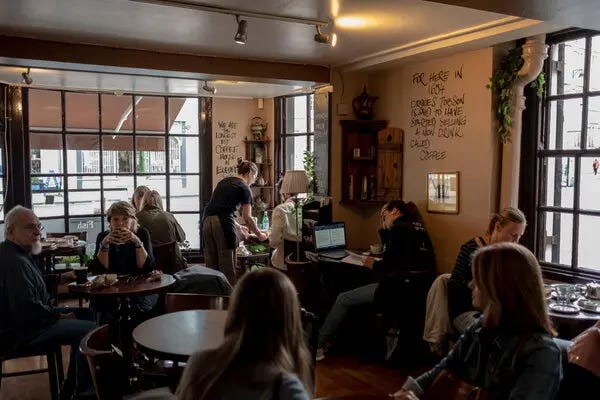Welcome to the NORTHERN HERITAGE Snapshot #4! A series of short, quick dives into heritage topics in Prince George and the North.
This one is all about cafes…
Third Places
In The Great Good Place, Ray Oldenburg (1999) introduced the idea of ‘Third Places’, gathering places that are not home or work, but the places that help get people through the day. Oldenburg describes the Third Place as:
a generic designation for a great variety of public places that host the regular, voluntary, informal, and happily anticipated gatherings of individuals beyond the realms of home and work.
He emphasized the importance of neighborhood gathering places in enhancing the lives of people.
We become attached to these Third Places, forming place attachment - special bonds that hold deep meaning to the individual, or what Tuan ( Rootedness versus Sense of Place 1980) referred to as a state of rootedness in which one’s personality merges with one’s place, engendering a sense of belonging and attachment.
Cafes as Third Places
Coffee shops are quintessential Third Places. They offer unique environments combining easy accessibility with a sense of personal space, acting as neutral grounds for diverse groups to meet and interact. Cafes do much more than just serving coffee; they are vital community centers where people gather for so many different reasons, from socializing to solitary contemplation.
Cafes cater to a broad audience, mixing people from diverse backgrounds, ages and cultures at any given time. This diversity enriches the social experience, allowing patrons to encounter people outside their regular circles — creating opportunities for new experiences and interactions. The atmosphere of openness and acceptance in these coffee shops fosters a welcoming environment for everyone, making them integral to the community’s social fabric.
Importance of Third Places as a Big Town becomes a Small City
In cities like Prince George where we see a great deal of change and movement of people, negotiating place attachment is important. What used to be a small and then a big town is now undeniably a small city. One of the distinctive features of cities is that they are places where we are exposed to and meet others, in contrast to life in small towns and villages where people and families know each other for generations.
In such a changing universe people can develop a sense of place connectedness, through habitual and regular usage of places like cafes, constructing social meaning and belonging.
The Ideal Cafe
An interesting study was carried out to explore the physical and social qualities that encouraged people to gather in third places, specifically coffee shops, and develop an attachment to those places ( Waxman, Journal of Interior Design, Vol 31 2006).
In addition to expected characteristics like cleanliness, good lighting, nice decor, comfy furniture and the aroma of coffee, there were a few notable qualities that made a cafe ‘ideal’:
not just comfortable furniture but furniture that can be freely moved about by patrons to create their preferred social arrangement; to stake out territory and make the place even more your own
the freedom to linger over coffee(s) for extended periods of time with no pressure to move on and free up space - confirming our belonging
the opportunity for anonymity and solitary socializing; patrons can feel that they had a social outing despite sitting alone and not engaging in conversation. A good cafe provides the ability to occupy the same place together in different ways - to interact with others or not, come alone or in a group
the correct level of ambient noise that supports Cafe Creativity. A University of Illinois study found that individuals came up with more creative ideas when exposed to ambient sound at 70 decibels - the average volume of a bustling coffee shop.
a touch of noise, a pinch of distraction, and a sprinkle of conversation can cause a helpful disfluency, which, research suggests, spurs you to think on a more abstract level.
The coffee shop is where adults engage in parallel play. Alone in the crowd I am not really alone at all. Many patrons when interviewed for the study responded that the coffee shop is a place they went if they wanted to feel productive.
Am I the only one of us at NORTHERN HERITAGE who goes to a favourite cafe every week alone to organize my work load, sort out thorny problems and think great thoughts? Maybe I’ve sat next to a newsletter reader and not realized!
Cafes as Heritage
In our newsletter of February 7, Northern Heritage, we discussed what we mean by “heritage”, looking at definitions from UNESCO, Heritage BC and First Nations. We agreed that basically they overlap while saying much the same thing:
Heritage can be any aspect of life and culture, tangible and intangible, living or dead, in which we find meaning and which, in some way, binds us to people and places.
Cafes frequently fulfil this definition; they are not just about leisure, they significantly contribute to urban vibrancy, social unity, and cultural heritage. Globally, individual cafes and cafe culture are recognized and cherished as important parts of heritage: Italian expresso, Colombian coffee plantations and Turkish coffee culture are all recognized by UNESCO and cafes in Buenos Aires, Paris and Shanghai, for example, are national heritage, associated with famous authors, social movements and revolutions.
Prince George’s cafes may not rival these in terms of glorious architecture or links to world famous philosophers, but they essentially and importantly perform the exact same functions as integral components of the city’s social and economic structures, offering spaces that enhance the urban environment and:
a physical third space in an increasingly digital world, a place to acknowledge the presence of other people and be acknowledged in return, and a source of quiet but steadfast community (Elena Olvera 2024).
Just think back to the bleak days of Covid and lockdowns and how much we missed our cafe-days, how we still mourn the loss of favourite coffee shops that couldn’t survive the closures… If a person’s presence in a coffee shop somehow validates or confirms their existence as a social member of the community, then we temporarily lost a place to acknowledge the presence of other people and be acknowledged in return, and a source of quiet but steadfast community.
Having lived in a city for sixteen years with no cafes (until just before I left for good), I perhaps have an over-developed appreciation for these wonderful places! I think that Prince George is fortunate to have an array of great cafes to choose from, to meet up with friends, discuss life and plan the revolution — making heritage that matters.
Speaking of coffee, heritage and inspiration…!
If you found this and my previous newsletters interesting or valuable, I hope you’ll consider buying me a coffee! For now I hope to keep this newsletter free with no paywall so that I can reach as many readers as possible, but even a few dollars now and then can make a big difference - Scan the code and support my writing - and the coffee that keeps me at it! (Thanks to Alyssa - Supporter #1!)
Respectfully acknowledging that I work, learn, and live on the ancestral lands of the Lheidli T'ehnneh peoples.








